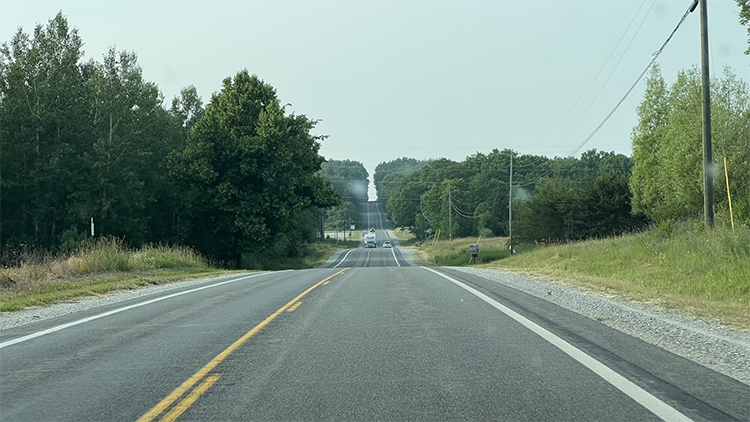By Ken Ogata
This story is part of a series on partnerships developed by the Midwest Big Data Innovation Hub with institutions across the Midwest through the Community Development and Engagement (CDE) Program.

As the ferry boat steadily cruised over Lake Michigan, it marked the halfway point of Midwest Big Data Innovation Hub (MBDH) Outreach and Engagement Specialist J.D. Graham’s journey, which spanned thousands of miles and multiple states. Throughout the summer of 2023, Graham helped organize and co-lead three data science education workshops, collaborating with colleges across the Midwest to inspire both students and educators alike. Each was funded, in part, by the MBDH Community Development and Engagement Program. The workshops aimed at educating students about data science, especially communities often left out of the gated walls of higher education.
Graham stresses the importance of being there in person, and not just working remotely from his home in Illinois. “It really does matter to be there. To see that institution, the academic culture, their leadership . . . make the little conversations with people you don’t even know,” Graham said. “But the moment I heard it could exist, I was super excited to be able to do that. I like to travel.”
Prior to his position at the MBDH, Graham worked as an educator for 21 years, gaining experience with students from elementary school through college. This included teaching at the elementary and secondary levels as well as being a life coach for high school and college students at Kankakee Community College’s Upward Bound program. There, Graham worked on programs preparing at-risk students for college, further expanding his knowledge of learners’ needs across educational stages. Graham states that this broad classroom experience across student populations came in handy when facilitating the recent data science workshops.
“I have 20-plus years of reading a classroom to know what confusion, exhaustion, frustration, and success looks like,” Graham said. “If you aren’t used to dealing with those age ranges, by the time they will tell you that they will be telling you in actions, not words.”
The first workshop was in partnership with Central Michigan University and local school districts, with the goal to raise awareness of data science as a career path, especially for students who had not been exposed to this field before. The workshop introduced the field of data science through activities with R software and analyzing real-life datasets. While data science may be an exciting topic for many, Graham and his team realized that teaching teens about it was a delicate process—one that required building relationships with the students and making sure that the pace was just the right speed.
“If you make it an exciting, entertaining version of science, then you can sneak in the more difficult and frustrating parts of science,” Graham said.
The process of building trust with the students was not limited to the classroom either.
“We actually drove to their homes to pick them up to bring them to school. And during those periods of time, it’s not silence. It’s chatter. It’s talk,” said Graham. “They’re looking for a connection and these are the openings you use to click with the kids.”
As an educator, Graham is more than aware of the hurdles that exist in higher education, especially those in minority communities. “Most of us probably experience imposter syndrome, but these students have it on level 10. The moment they step in, they feel like outsiders.”
For Graham and his team, it was not only crucial to let the students see data science as a possible future for them, but also higher education in general. Throughout the workshop, Graham and his team brought in university tour guides and a financial aid counselor to help introduce the students to federal financial aid through the Free Application for Federal Student Aid (FAFSA) form.
“It’s so important because this face-to-face connection with people is the true boots on the ground, it’s how you change ideas, and how you build memories and experiences that will last a lifetime,” Graham said. “It lowers those barriers of entry and allows them to know that this is an accessible institution, and it’s right here in my neighborhood.”

The second workshop, in collaboration with St. Catherine University in Saint Paul, Minnesota, shared a similar goal to the first workshop. The five-day-long STEM academy was on-site at St. Catherine University and helped middle school girls in the local community engage with science through coding, rocket experiments, and 3-D printers. But on top of the activities planned for the kids, the workshop aimed to bolster the idea of Women and Girls in STEM, and allow children to envision opportunities that seemed unattainable to them.
“Most of the students I talked to said over and over ‘I just didn’t even know this existed or that this was a possibility,’” Graham said. “Allowing them to dream, to imagine themselves there. Maybe it’s not going to be in data science. But now it brings in whole new areas of study they’ve never even considered.”
A third MBDH workshop, the Workshop on Data for Good for Education (D4G4ED), was in collaboration with Trinity Christian College near Chicago and was primarily for educators and graduate students interested in exchanging ideas regarding teaching practices about data.
“Part of my job was to find people who not only cared about social good, and how to teach social good, but I also wanted to bring together a unique group of people with diverse backgrounds, so that they could learn from each other . . . to meet with professionals and passionate thinkers who they’d never have the chance to collaborate with on their own,” Graham said. He added, “Where else could a graduate student, a professor of Africana Studies, a virtual data viz instructor, and a data manager for the Department of Defense all meet up and discuss teaching data science for social good?”
The D4G4ED workshop was not only a place for educators alike to interact with each other and share ideas, but also aimed to challenge stereotypes and barriers that exist in certain fields of study in higher education. For Graham and his team, it was imperative that the workshop was not closed off to people who felt like they lacked the technical skills for data-related education, but to unite people under the idea of data science.
“[The] program was all about getting these diverse individuals whose communities, probably more than most, care about social causes and show them that data science can be used to promote and amplify those causes that they care about,” Graham said.
Graham also mentioned that the workshop was a great way to build relationships with his peers and noted how the workshops led to personal growth for him as well.
“Whenever I get to meet new people, whether it be professional or social, it allows me to get to see new tools and how they’re used, so I can incorporate them into my toolbox,” Graham said. “Meeting new educators, you learn new techniques, but just as importantly: meeting new students from new backgrounds. With different life experiences, I have learned so much from them as well.”
Through these workshops, Graham worked to demystify higher education and the field of data science. Graham’s work echoes the need for continued work towards breaking down the barriers that prevent many underrepresented groups from participating in academia.
Get Involved
Contact the Midwest Big Data Innovation Hub if you’re aware of other people or data science education projects we should profile here, or to participate in any of our community-led Priority Areas. The MBDH has a variety of ways to get involved with our community and activities, including our Data Science Student Groups Community webinar series.
The Midwest Big Data Innovation Hub is an NSF-funded partnership of the University of Illinois at Urbana-Champaign, Indiana University, Iowa State University, the University of Michigan, the University of Minnesota, and the University of North Dakota, and is focused on developing collaborations in the 12-state Midwest region. Learn more about the national NSF Big Data Hubs community.
